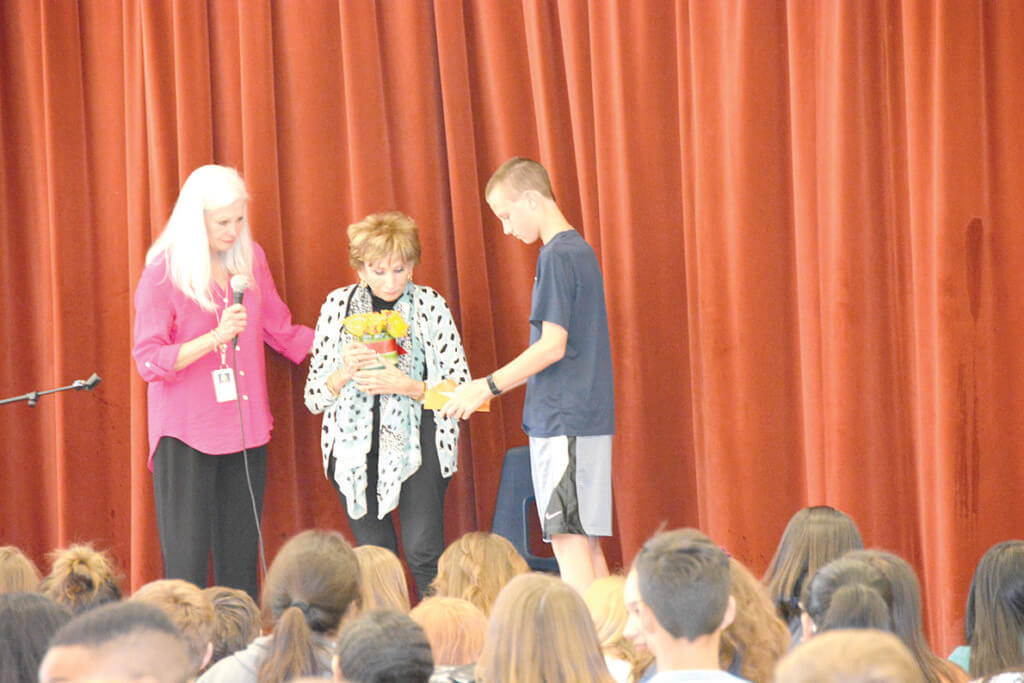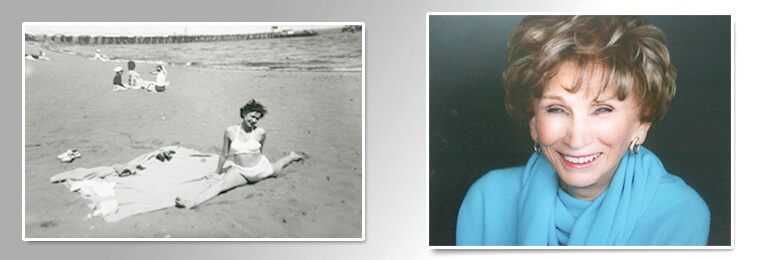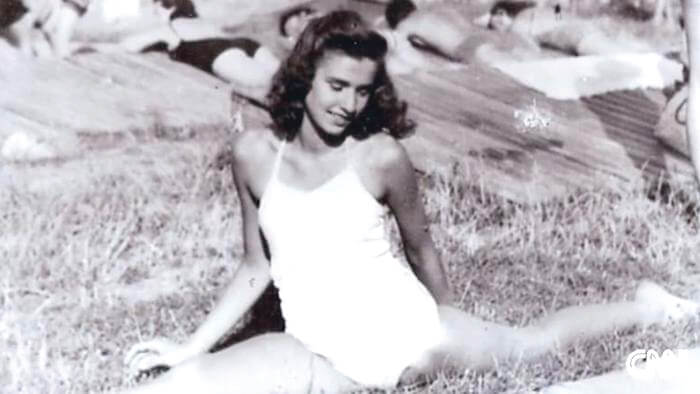
Dr. Edith Eva Eger survived the Holocaust and shared her story with 8th graders at Canyon Ridge Middle School in May. Principal Susan Sullivan and the students showed their appreciation of her presentation.
“The visit that changed lives”
By QUIN COLLINS, DAVIS FISHER, MICHAEL MASTRODICASA, DEVAN PATEL
Dr. Edith Eva Eger shared with Canyon Ridge Middle School 8th graders details about the 72nd anniversary of her liberation as a Holocaust survivor.
Eger’s inspiring story was one of overcoming difficulty with positivity, she explained on May 4 to a packed room of students. She was taken to Auschwitz when she was 17-years-old, and she watched as her family was taken away from her. Later, she endured a death march and worked in a labor camp. Eger was forced to dance for Nazi leaders, and she now believes that dance saved her life. She has overcome hardships that no one can begin to imagine.
Eger vividly remembered arriving at Auschwitz and trying to follow her mother, but was forced in the opposite direction, signaling life. Josef Mengele — also known as the “Angel of Death ” looked her in the eye, and told her that her parents were just going to take a quick shower. She was deceptively told that she would be reunited with her family shortly. However, it was the last time she would ever see her parents.
Later, Mengele came to her barracks and wanted to be entertained. Eger’s friends ushered her forward and explained how she was an accomplished ballet dancer. She was then forced to perform in front of Nazi leaders. She tried to remain optimistic, so she pretended that she was dancing in the Budapest opera house to Tchaikovsky’s music. By staying positive, Eger ignored the fact she was dancing in front of the “Angel of Death” and found herself lost in the music. She was awarded an extra ration of bread for her performance and she shared it with the other girls in her barrack. This act of generosity would later save her life.
While in Auschwitz, Eger’s sister, Magda, weakly told her, “If I don’t get any food, I will die.” Eger had already given her sister her ration of bread, so she decided to climb over the fence to get carrots. She recounted this moment,
“On my way back over the fence, a soldier caught me and pointed the gun at me, I started praying for the soldier, that he would have any sense of good in him. He then released me back to my barrack.”
Egar then announced, “The same soldier came into my barracks and had asked who was the one that climbed the fence earlier.” She remembers raising her hand shyly. Â The guard awarded her a piece of bread saying, “You must have been starving to do what you did.” “It is amazing at such terrible times that people can be so amiable and gracious,” Eger excitedly stated.
Throughout World War II, Eger endured what many Jews couldn’t. Death marches took a mental and physical toll on those who were forced to walk for long periods of time without food or water. The moment someone gave up and stopped, they were shot. During the walk, Eger recounted feeling weak and wanting to stop. She knew she would be shot. However, her friends with whom she shared her extra ration of bread, formed a chair with their hands and carried her during the death march. If it weren’t for the kind acts of Eger towards her peers, she would not have been at CRMS to share her wisdom with the 8th grade students.
During the Holocaust, people changed and adapted in any way they could in order to increase their chances of survival. Those who survived the atrocities, learned that they had to work together and move away from their selfish feelings.
When Eger was reflecting on positivity, she also recalled information about her sisters. She had two older beautiful sisters. The relationship between her sisters wasn’t the greatest, because they would always make fun of her and call her ugly. However, when the only living parts of her family were Magda and herself, Eger held on to the one bond that was still intact. When the kids were shaved of all of their hair, Magda, one of her older sisters, asked Eger “How do I look?” Eger could have chose to insult her or say that she was ugly, but instead, she said,” With all of your hair in the way, I never realized how beautiful your eyes were.” With a compliment, she avoided conflict and instead strengthened the bond with her sister.
When she was finished with her awe-inspiring speech, Eger opened the floor for student questions. Every time a student went up to talk to her, she would hug them as tight as physics would allow.
A student with a considerable challenge went up on stage to ask a question. Before she could, Eger quickly praised her, saying, “thank you… thank you… thank you, thank you so much, for not giving up. What a good role model, God bless you.” It was a special experience because Eger’s son suffered from the same challenges. The child asked,”Is it hard, do you still have flashbacks?” Eger quickly responded without hesitation that there is never a time when she doesn’t relive the experiences. She gave an example of a recent chronicle where she parked in the back of Costco perceiving the barbed wire and instantly she was in Auschwitz. Another student inquired, “How do you think you found the strength to remain so optimistic?” Eger, thought about it and responded, “You know, I’m not so optimistic but realistic.” Later she expanded on how being optimistic to a certain extent eventually ends up in sarcastic happiness.
Eger informed the 8th graders about how the biggest concentration camp is in your mind, and the key is in your pocket. Her survival was due to many fortunate events and kind people that helped her push forward.
Eger inspired the CRMS 8th graders to stray away from their selfish thoughts and instead attempt to help others. She shared her one-of-a-kind life story with the students, and shared how the hardships shaped her life and changed her for the better. She used her experiences to give advice to the students about how they could be kinder and more appreciative. She encouraged the students to participate during class, opposed to anticipating what will come next. The students were urged to check in to the present moment because, like her mother once said, “Nobody can take away from you what put in your own mind.”
Former Canyon Ridge Middle School 8th graders wrote this piece.


